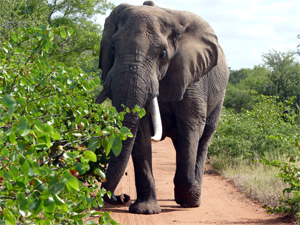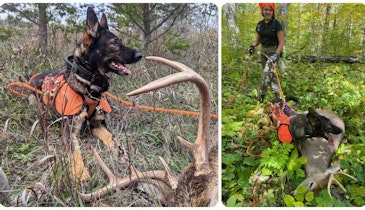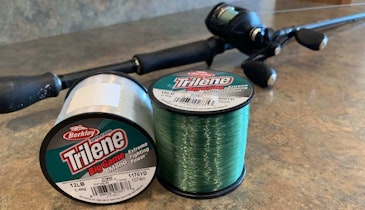Photo: John Hafner
What makes a deer's sense of smell so elite? First consider the interior of a deer's nose. It has hundreds of thousands, if not millions, of nerve cells. In fact, there are probably thousands of groups of cells in the nose, and each group can detect one odor. This means that a deer has a group of cells in its nose that can detect acorns, and others that detect alfalfa, corn, certain twigs, dead leaves and dogs. There are nerve cells dedicated to detecting other deer, human deodorant, gasoline on gloves, and so on and so on.
You name the odor, and a deer has a group of cells located in one tiny region of the nose that can smell that odor.
Once that odor hits those receptor cells, it triggers an area of the deer's brain. For example, when a deer smells an acorn, that activates the acorn nerve cells in the nose and that then sends a message to a part of the brain which leads to a pattern of behavior. Therein lies the key to how deer get you. If a young deer has a bad experience with a dog, a pattern of behavior is created in that deer's brain. The next time the deer smells a dog, the deer flees. But if this deer grows up in a park where there is no hunting, and people walk their dogs on a leash all the time, then a dog's odor probably won't trigger that same negative response.
Pursuing that idea further, if a deer grows up in an urban environment (as millions now do), then the odors it smells related to humans won't trigger a negative response. But if that deer first smells a human odor in the wild and the initial encounter was negative, then the moment the deer gets a whiff of the same human odor again, it bolts.
Why do certain receptor cells pick up a distinct odor, while others do not?
Research suggest genetics are involved, essentially coding scent receptors to recognize certain smells. An article featured on Brain Science Today reported on research published to Genome Research, which examined gene codes and scent receptors in 13 mammal species.
"Among this group they identified more than 10,000 different genes that code for scent receptors," cites the report. "Most animals had a nearly unique repertoire, with only three genes in common amongst all the species."
Of the 13 mammals studied, here's a list of species with the most robust OR repertoire (as they call the collection of olfaction genes which inform the scent receptors), from most OR genes to least:
- Elephants
- Rats
- Cows
- Mice
- Horses
- Dogs
- Guinea pigs
- Rabbits
- Humans
- Chimpanzees
- Marmosets
- Macaques
- Orangutans
Unfortunately, deer weren't among the species studied, so it's uncertain where they would fall on the list. It's also uncertain how much the number of olfaction genes impacts an animal's ability to pick up scent. For instance while elephants — which rank No. 1 on our list — are considered to possess a respectable sense of smell, it's not considered exceptional.
Where does a deer's sense of smell rank among the best sniffers?
While we don't know the number of olfaction genes a deer has, we do know the number of olfactory scent receptors. In an offbeat article exploring whether or not deer can smell a hunter's farts, deer are reported to have 297 million scent receptors. In comparison, humans have 5 million and dogs have 220 million.
The article also cites an excerpt from “Bows, Swamps, Whitetails,” a book authored by Tim Lewis. He writes that not only do deer have at least 2,000 percent more scent receptors than humans, they also have more types of receptors. Meaning, deer can detect scents that humans simply can’t comprehend.
How to overcome a deer's keen sense of smell
If you don't hunt deer, then you're happy for a deer's smelling abilities. Carry on and prosper, you might say. But if you're a hunter pursuing these animals, overcoming a deer's sense of smell is priority No. 1.
Here are related posts to help you hone your skills and mask your unsavory human stank.
Related: The merits of homemade deer scent
Related: Does human urine scare deer?
Related: Scents: The secret art of deer attractants
Related: To kill mature bucks, reveal the wind
Amy Hatfield contributed to this story.







